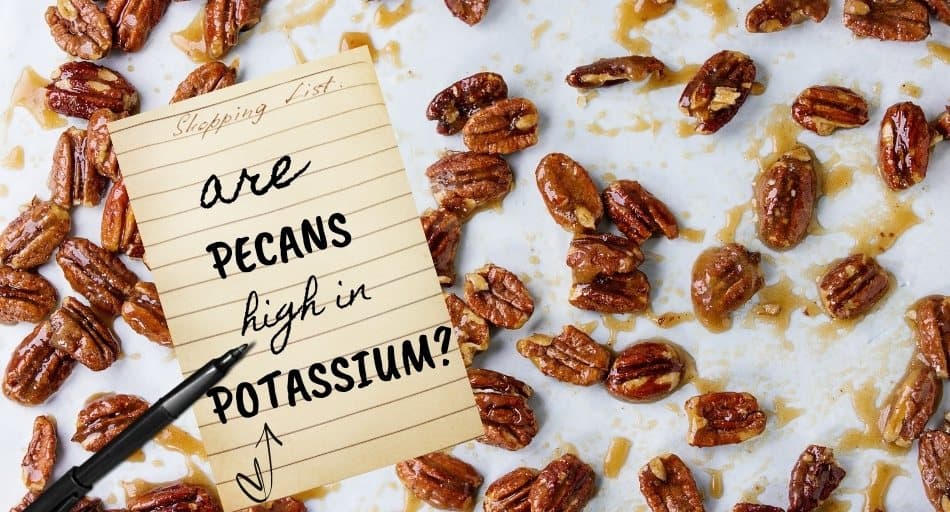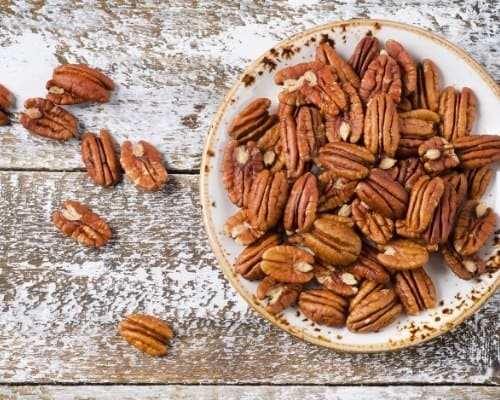Pecans are some of the healthiest nuts out there, loaded with nutrients, minerals, and vitamins that help you stay healthy. They’re also delicious and extremely versatile, which means they can add them to your diet with ease.

But, if you’re following a special diet, such as a low-potassium diet, it’s important to ensure any new food is suitable for your dietary requirements. So, are pecans high in potassium? Should you add them to a kidney-friendly diet?
Table of Contents
Are Pecans High In Potassium?
Pecans are categorized as a low-potassium food since they don’t contain a lot of this mineral in a single serving. Because of that, they can be safely added to a kidney-friendly diet without causing any health problems. Pecans are also loaded with minerals and vitamins that contribute to various vital bodily functions.
Adding pecans to your diet can not only boost your health but also ward off many health conditions.
How much potassium is in pecans?
A single one-ounce serving of dry-roasted pecans contains around 119mg of potassium. The general rule states that if a single portion of any food contains less than 200mg of potassium, it can be safely incorporated into a low-potassium, kidney-friendly diet.
Because of that, pecans are a great snack or addition to any other meals that won’t cause any unpleasant symptoms.
There’s also a very small difference in the potassium content between dry-roasted and oil-roasted pecans. Oil-roasted pecans contain around 110mg of potassium, which doesn’t make them better or worse for people with kidney issues.
Oil-roasted pecans are slightly higher in calories and fats, though, so if you’re also trying to lose weight, it might be best to opt for dry-roasted pecans.
Another choice is consuming raw pecans. These are slightly harder for your stomach to digest, though, so make sure that you don’t suffer from any digestive system issues before opting for this kind.
On the bright side, raw, unroasted pecans are also higher in several micronutrients, including thiamin and magnesium. The difference isn’t huge, so if you prefer consuming roasted pecans, they’re still a wonderful source of nutrients.

Are pecans healthy?
Just like all other nuts, pecans are very healthy. They’re a wonderful source of fiber and protein, which are two nutrients that help you stay full after a meal, preventing overeating and weight gain.
Fiber helps feed the good gut bacteria in your stomach that protect your stomach against inflammation and irritation. This health benefit is particularly good for people with kidney issues as inflammation can worsen your symptoms.
Pecans also contain more than half of your daily recommended need for manganese. This mineral has strong antioxidant properties, helping you flush out harmful free radicals, thus preventing oxidative stress and damage to your cells.
In combination with other nutrients, manganese also contributes to good bone health and density, which means that it can help prevent bone issues, such as osteoporosis.
Another mineral that pecans are a good source of is copper. It works closely with iron to help create red blood cells and protect your blood vessels and nerves from damage.
Your body requires only trace amounts of copper, so even consuming a single one-ounce serving of pecans can help fulfill your daily recommended need for this nutrient and reap its health benefits.
Pecans also contain essential plant compounds that may protect your health and cardiovascular system. They’re also rich in fatty acids that prevent your arteries from getting clogged, which may cause heart attack, stroke, and even type 2 diabetes.
In the same way, consuming pecans can lower your bad cholesterol levels while increasing ‘good’ cholesterol levels. Because of that, pecans can help your body fight off inflammation of the heart and arteries.
Since pecans are rich in poly- and monosaturated fats, they also contribute to boosting your brain function. In fact, studies show that regular consumption of these kinds of fatty acids leads to improved long-term memory cognition.
What’s more, consuming even ⅓ of a one-ounce serving of pecans can lower the risk of early-onset dementia and many other cognitive, so it’s very easy to reach this goal.

Pecans also contain a good amount of zinc – a mineral that helps you prevent acne and boost your immune system. It also reduces inflammation in your body, preventing various health conditions, including cancer and age-related diseases.
Because of its inflammation-reducing properties, it’s often used as a dietary supplement, but, as always, it’s best to get your vitamins and minerals from natural sources, such as pecans.
Can you take in too much potassium from pecans?
Pecans contain less than 200mg of potassium in a single serving. Because of that, it’s very unlikely to consume too much potassium from just consuming pecans. But, if you tend to consume more than a single serving in one sitting, make sure not to eat too many other potassium-rich foods to compensate for that.
To avoid eating too many pecans in one sitting, try buying prepackaged portions, which usually don’t contain more than a single serving. That way, you’ll be able to control how much potassium you consume without overdoing it.
Choosing prepackaged pecans also allows you to control how many calories you’re taking in, which helps prevent weight gain.
Aside from the potassium content, it’s also important to check if the pecans you’re choosing have added salt. This is because consuming a diet high in sodium puts even more stress on your kidneys. So, if you’re already dealing with kidney issues, consuming foods high in sodium is a bad idea.
Luckily, many brands sell pecans without any added salt, so it’s best to choose these instead of those loaded with sodium.
Pecans are a low-potassium food rich in many nutrients, minerals, and vitamins. Because of that, they make for a wonderful addition to any diet, including kidney-friendly, low-in-potassium dietary plans.
Pecans are also incredibly versatile, making them easy to add to any diet, including as a snack or part of a larger meal. Because of all that, there’s no reason not to incorporate pecans into your diet.
Don't know which foods are high in potassium? Read our article, 15 Best Food Sources of Potassium. We also have a guide to this important mineral: Potassium 101: All You Need To Know About Potassium.
